

Finding our way here at International School Ho Chi Minh City. PYP Feed. Developing a central idea. Teaching the PYP by Mandy Osenton on Prezi. Traver. What is a good question. Untitled. Five Steps to Driving PYP Instruction with Key Concepts. Move over topic and content driven PYP instruction, it is time to let the conceptual based approach to learning take the steering wheel, put its powerful foot on the gas, and drive our students’ to deeper inquiries and learning!
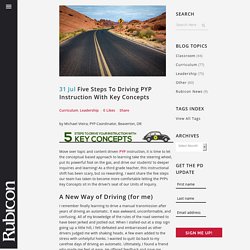
As a third grade teacher, this instructional shift has been scary, but so rewarding.
How do inquiry teachers….teach? "Tuning In" Strategies for Starting a New Unit - 5 for Friday. I'm linking up With Doodle Bugs Teaching's 5 for Friday in a different way - Instead of sharing 5 random things we did this week, I'm sharing 5 ways tostart a new unit with your class!
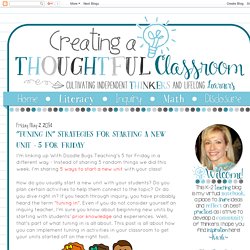
How do you usually start a new unit with your students? Do you plan certain activities to help them connect to the topic? Or do you dive right in? If you teach through inquiry, you have probably heard the term "tuning in". Where the Wonders of Learning Never Cease. Curiosity Machine, Exploration into Learning Online Shop. Inspiring Students to Math Success and a Growth Mindset. Solve It Your Way! Just Let Me Play: Tinkering for the Fun & FancyMs. Carmelina DiGrigoli, B.A., B.Ed., OCT - Teaching Blog.
How we express ourselves: A kindergarten inquiry. Tasha Cowdy is the PYP coordinator at the Anglo American School of Moscow in the Russian Federation “We are currently working on a unit of inquiry into How we express ourselves.
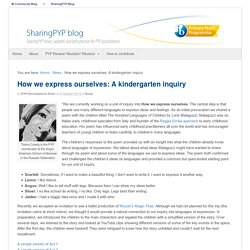
The central idea is that people use many different languages to express ideas and feelings. As an initial provocation we shared a poem with the children titled The Hundred Languages of Children by Loris Malaguzzi. Malaguzzi was an Italian early childhood specialist from Italy and founder of the Reggio Emilia approach to early childhood education. His poem has influenced early childhood practitioners all over the world and has encouraged teachers of young children to listen carefully to children’s many languages. The children’s responses to the poem provided us with an insight into what the children already know about languages of expression.
Ms. Twist's Classroom. September 26, 2012 One thing that I’ve learned being an IB Age 3 teacher is it’s difficult to introduce the IB Learner Profiles, Attitudes, Concepts, Skills, and Action Cycle to the students.
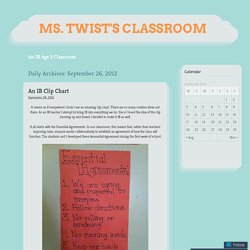
However, I believe it is possible and you can work them all in during Circle Time! We first begin our day my choosing our Learner Profile for the day. The students come up one at a time and choose the Learner Profile they would like to work on for the day. I ask, “What Learner Profile will you Choose, Act and Reflect on today?” We then transition into choosing Our Responsibilities. @alisoneducates:Reflections of an Early Years PYP Teacher - Blog. Current Events for Kids; News for Kids; World News for Students. PYPC Handbook. Dummies. Visible Thinking. IBOPYPflyerEng. A Half Day of Personalized Professional Learning – Making Good Humans.
Last week I shared our journey towards a half day of personalized professional learning for our Elementary staff.
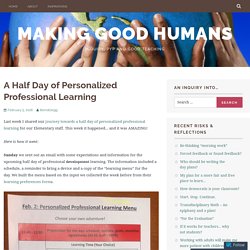
This week it happened… and it was AMAZING! Here is how it went: Sunday we sent out an email with some expectations and information for the upcoming half day of professional development learning. The information included a schedule, a reminder to bring a device and a copy of the “learning menu” for the day. We built the menu based on the input we collected the week before from their learning preferences forms. Pyp colombia summary en. Sample POI. ESProgrammeofInquiryPOI2014 2015WEBVERSION. IBO Program Standards. Sir Ken Robinson: Bring on the learning revolution! TEDxWestVancouverED. Stop, Start, Continue: Conceptual Understanding Meets Applied Problem Solving. I recently became the Chief Academic Officer for the International Baccalaureate (IB) after more than two decades of working in and leading IB schools.
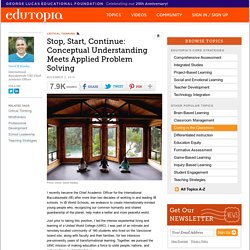
In IB World Schools, we endeavor to create internationally-minded young people who, recognizing our common humanity and shared guardianship of the planet, help make a better and more peaceful world. Just prior to taking this position, I led the intense experiential living and learning of a United World College (UWC). I was part of an intimate and remotely-located community of 160 students who lived on the Vancouver Island site, along with faculty and their families, for two intensive pre-university years of transformational learning.
Together, we pursued the UWC mission of making education a force to unite people, nations, and cultures for a sustainable future. Revolutionizing School. It's not about getting the right answers but rather, asking really good questions. IB self study. Conversation…
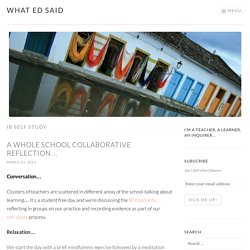
A (massive) collaborative curriculum review… How (and why?!)
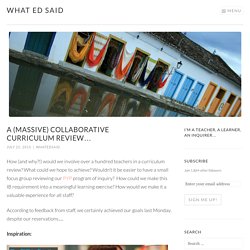
Would we involve over a hundred teachers in a curriculum review? What could we hope to achieve? Wouldn’t it be easier to have a small focus group reviewing our PYP program of inquiry? How could we make this IB requirement into a meaningful learning exercise? How would we make it a valuable experience for all staff? According to feedback from staff, we certainly achieved our goals last Monday, despite our reservations… Inspiration: What Ed Said. There’s a buzz in the room as 11 year olds sit in groups around large sheets of butcher paper, talking animatedly.
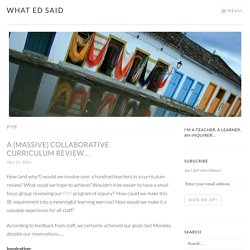
I like visiting this classroom, seeing how the two teachers collaborate and the children engage in their learning. Today they are brainstorming the ‘big ideas’ in ‘Sharing the Planet’, one of the trans disciplinary themes in the PYP curriculum framework. In the build-up to this, students have watched David Attenborough’s Wonderful World and made connections with the trans disciplinary theme – ‘Inquiry into rights and responsibilities in the struggle to share finite resources with other people and other living things; communities and the relationship within and between them; access to equal opportunities; peace and conflict resolution.’
(IB Primary Years Program) The teachers introduce the idea of biodiversity, a concept to which they haven’t been exposed before, without explaining it or doing any ‘teaching’. Reflecting on PYP Planners. I have rarely found the process of reflecting at the end of a Unit of Inquiry via the PYP Planner (sections 6-9) an informative or productive process – as a teacher or as a coordinator.
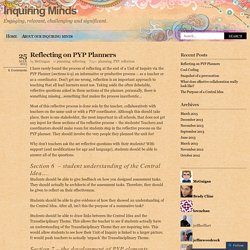
Don’t get me wrong, reflection is an important approach to teaching that all lead learners must use. Taking aside the often debatable, reflective questions asked in these sections of the planner, personally, there is something missing…something that makes the process inauthentic… Most of this reflective process is done solo by the teacher, collaboratively with teachers on the same unit or with a PYP coordinator. Although this should take place, there is one stakeholder, the most important in all schools, that does not get any input for these sections of the reflective process – the students! Edutopia- Inquiry Based Learning. Inquiry-based learning is more than asking a student what he or she wants to know. It’s about triggering curiosity. And activating a student’s curiosity is, I would argue, a far more important and complex goal than the objective of mere information delivery. Nevertheless, despite its complexity, inquiry-based learning can be somehow easier on teachers, too.
True, it’s seemingly easier because it transfers some responsibilities from teachers to students, but it’s really easier because releasing authority engages students. Fostering Student Questions: Strategies for Inquiry-Based Learning. Ramsey Musallam’s TED Talk on his "3 Rules to Spark Learning" inspires the need to foster students' curiosity. As educators, we want them to ask questions and explore their ideas, which can lead to a rich inquiry-based classroom. From young children whose mantra for everything is "Why? " to teens that require effective inquiry skills as part of their preparation for successful post-secondary life, this need is high. But our challenge is where to begin. Here are four protocols to help jump-start a culture of fostering student inquiry that, in turn, fosters questions and ideas. 1. The Question Formulation Technique offers a starting place to teach students how to construct questions that meet their needs. 2.
One challenge to generating substantive questions and ideas is getting every student's voice heard. Inquiry-based learning in the early years. Rebecca Smith, an early years practitioner at ESF International Kindergarten – Hillside, Hong Kong This is an overview of what inspired an early years educator to accomplish a research project which explored how early years practitioners perceive inquiry-based learning when utilizing the PYP curriculum framework with very young learners in Hong Kong. I have worked in a few international schools that are implementing the IB’s Primary Years Programme curriculum framework in Hong Kong. My experiences include working in a co-teaching bilingual setting and an English medium environment. How healthy is your team planning? Over the last few weeks I have spent a lot of time ‘at the planning table’ with teams in several schools.
I always relish the opportunity to be part of a healthy collaborative planning session – I love the energy generated by ideas, the sense of possibility and the creative and social process that is authentic planning. I have also recently spent time in another institution – a hospital – caring for a family member. Today, as I listened to and watched the medical staff at work, I was reminded of the importance of stopping to closely examine ourselves professionally. Planning for inquiry… ‘Language is a vehicle for communication and self expression.‘ It’s a starting point for a central idea for a new inquiry unit in How We Express Ourselves and no-one in the room is excited. The draft central idea seems like a statement of the obvious and teachers are concerned that it might not have the potential to invite student inquiry.
We can see opportunities for the development of skills and outcomes in our English scope and sequence, exposure to Aboriginal culture, obvious links with second language learning and wonderful ways to incorporate the arts. . … Inquiry teachers are not afraid to let go. Planning in response to learning…
From Faking It to Making It: A PYP Reflection. An O’Dwyer protégée (photo: BISS) PYP threads. Grade 5 Blog – American International School/Dhaka, Bangladesh. A showcase of learning, collaboration & innovation in the elementary classroom. Revolutionizing School. PYP concepts. Some ‘big ideas’ about concept driven learning: (From this week’s little #pypchat on Twitter) The world is changing. Knowledge is changing. It's not about getting the right answers but rather, asking really good questions.
SharingPYP blog. #pypchat hashtag. Making Good Humans – Inquiry, PYP and Good Teaching. What Is Missing in the Common Core Standards? Life in the 21st century is evolving at a rapid and challenging pace, creating a renewed focus on the lack of fit between what education is and what it needs to be. In the United States, the most recent call for education reform is the implementation of the Common Core State Standards, which highlight the importance of curriculum alignment and integration, a respect for multiple perspectives, and the provision of a well-rounded education that prepares students for college and career readiness.
The International Baccalaureate (IB) recognizes many areas of convergence between its aims to develop inquiring, knowledgeable, and caring young people who help create a better and more peaceful world through intercultural understanding and respect and the standards. A grade 2 math inquiry. Encourage your students to plan the unit of inquiry. Dr Lyn Bird, Principal at Selwyn House School in Christchurch, New Zealand. Edutopia- Developing Student Questions.